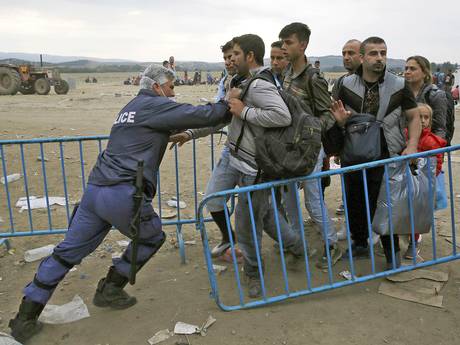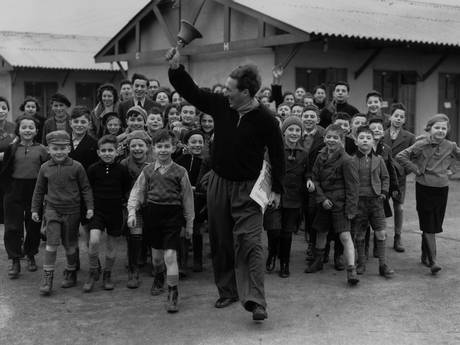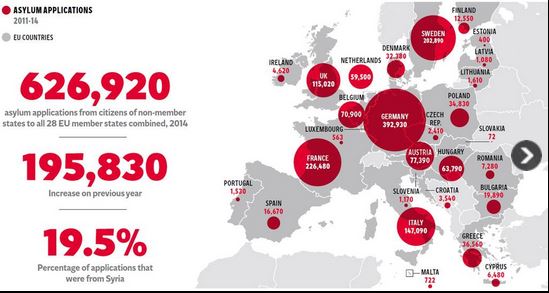
THANK GOD FOR GERMANY -- EUROPE APPEAARS TO HAVE FORGOTTEN THE AGE-OLD LESSONS OF HISTORY
Robert Fisk
And we could trace their paths, the verbal tracks of these invader/refugees. At university, I studied linguistics and spent weeks tracing the Ungrian language group who trekked up through the Baltic to Finland, the Latin language moving through what we now call the “Romance” language countries, how Gaelic moved from Ireland to Scotland. Having taken a Gaelic course for my PhD thesis in Dublin, I can actually read Scots names in the original. And when I was reporting the Balkan wars – I called myself the Ottoman Correspondent, as opposed to the expert journalists who lived there – I could see how the language of the Arabs passed through Turkey and became Serbo-Croat. In Arabic, “gezira” means “island”. In Serbo-Croat, it means “lake”. Near enough. It took me longer to work out Gorni Vakuf in Bosnia. “Vakuf” – a familiar enough second name to a town – was the Balkan corruption of “waqf” – in Arabic, an Islamic endowment.

A policeman pushes refugees behind a barrier at Greece's border with Macedonia, near the village of Idomeni, Greece (Reuters)
Migration is history, but history moves in mysterious ways. In his own PhD thesis, that great Yugoslav novelist Ivo Andric explained how the Turks divided the Orthodox and Catholic Christian peoples of the Balkans, how the Slav converters to Islam were used to break the Christians apart – because they were the middle classes and wanted to keep their lands under Ottoman rule – and, of course, poor Andric died before the Balkan wars of the 1990s. Muslims would later call him a war criminal. The commander of a concentration camp, a man called Popovic, would later tell me that Muslims should be called “Turks”. Those Slavs who converted to Islam in the 14th century could never have guessed the fate of their Bosnian Muslim descendants.
Nor could the 18th century Volga Germans – invited to Russia by the Tsar because of their engineering prowess – ever have imagined that the Tsar’s Communist successors would accuse their descendants of collaborating with the very same Wehrmach whom my Dad was supposed to fight – refugees alllowing – in 1940. Nor, let us face the facts, could the tens of thousands of Muslims who are now European citizens have thought that a creature like Isis would emerge to cast them all in the clothes of suspicion. But I remember chatting to a French policeman in Paris during a French Muslim demonstration and he used the word “beure” to describe them: not “beurre” as in “butter” but “beure” as in “Arab” spelled backwards with a French accent.
Yes, it’s a slippery road from invader to refugee to emigrant to citizen. And woe betide those who think the words can’t go in the reverse order. The English kept sending their finest to Ireland so that they would seed the good Irish ladies with their best. Over three centuries, we “Angles” actually believed we could woo the Gaels. But over and over again, the English turned into the Irish. They “went native”. They rather liked Ireland. They became Irishmen. Good Protestants became good Catholics. In fact, they became good Irishmen.
Now to politics, and, yes, there are some refugees – some who can’t “stay put” – who are very much our responsibility. Palestinian refugees, in their hundreds of thousands, are our responsibility. We think, because we made conflicting promises to their grandparents and the Jews a hundred years ago, that this somehow lets us off the hook. But for a Palestinian in the Lebanese refugee camps today, they wake up every morning in dirt-caked shacks amid sewage-washed alleyways. And for them, now, today – they are living the immediate results of the Balfour declarations. Indeed, for them, Lord Balfour signed his 1917 declaration, promising Britain’s support for a Jewish homeland in Palestine, only yesterday, last night. The ink is still wet on the paper. The Americans were too close to history to shrug off their debt to Vietnamese refugees. The burden of guilt was too close to the television screen. Yet for the more fossilised among us, things are less clear cut in the face of Iraqis, some of whom are among Europe’s newest refugees. After all, didn’t some of us die for their liberation from Saddam? How dare they come wandering to us for a new home?
And yet we all have our Ukip/Daily Mail moments. I had mine in Oslo Central Station in the winter of 2012 when I was on my way to Sweden, for The Independent, to investigate how Swedish explosives had found their way to anti-Assad rebels in Aleppo. (Memo to readers: they were in Volvo truck-alert braziers to be used on snowy Scandinavian roads – and were sent with all Volvo lorry exports to pre-war Syria.) But in Oslo station, I found gangs of feral young Pakistani men in leather jackets, prowling the passenger concourse at 6am to prey on the tired passengers. They were robber gangs, a part of the station’s life. And I found myself asking why these Pakistani youths wanted to bring the Karachi mafia to this beautiful country and to its educated, generous people? Not long afterwards, I asked myself the same question about the people from the same country who had abused young women in a British city.
When I was at school, an idiotic vicar (“Religious Affairs Teacher” was his preposterous title) tried to persuade us pupils that Christianity was all about being “tested”. God was setting us tests, you see, not just giving us instructions to obey (as he – God, not the Vicar – supposedly did to Muslims). But post-war Europe – or at least the geographically western sector of Europe – is indeed now being tested. We thought that our Judgement Day would involve a test of our war-loving nature: did we or did we not resist the temptation of a Third World War once Hitler was dead?
We passed that test. Rather well. But now it turns out that the real test is based not on our supposedly belligerent nature, but on our own preaching and sermonising and proselytising. We had lectured the Muslim Arab dictatorships (whose criminal bosses we propped up with money and weapons and torture-training) on the need for human rights, equality and justice. But then, suddenly, from this very land-mass, came a benighted people in their hundreds of thousands – perhaps thousands of thousands – who decided that in their moment of agony, they would like to throw their lives into the hands of these beautiful people who had been teaching them for so many decades about the benefits of heaven on earth. This immensely wealthy paradise – a land of milk and honey in the most literal sense in any supermarket – had for years been talking of its promise and its human goodness, of its immensely high standards of law and justice. Now these people would like to have some of it.
And we – in this critical hour in the history of our continent, in the history of the EU, in the story of what was once called “Christendom” – we failed the Great Test. Our state-of-the-art nations did not want these wretched people. They became bloodsuckers, human mosquitoes, people-smugglers, a “swarm”. And if the rags of our integrity as human beings have been salvaged these past few weeks, this is due to the dour, rather sour Protestant ethics of an east German hausfrau who history may (or may not, for let us remember her people’s grandfathers for whom my Dad was supposed to shoot his own refugees) say has saved our soul.

11th January 1939: A camp leader ringing the dinner bell at a camp for young Jewish refugees from Germany and Austria, at Dovercourt Bay near Harwich (Fox Photos/Getty Images)
But if our generosity stretched that far in welcoming Belgian refugees in the First World War, Jewish refugees before the Second World War, Germans afterwards, Hungarians fleeing the 1956 uprising, even a few Chernobyl survivors (some soon to die), they usually had two things in common. They were white – or as near as much as makes no difference – and they were European and – or as near as much as makes no difference – were from our monotheistic world. The Bosnian refugees of the early 1990s were mostly Muslim, of course, but they looked like and were Europeans, and their version of Islam was for us picturesque rather than religious: snow-covered mosques rather than hot Kabaas, a whiff of eastern cuisine washed down with slivovica, Ramadan-and-one-for-the-road.
But these chaps today, camping opposite Dover, for example, as my Dad’s racist friends used to say, were “black as the ace of spades”. Or a bit black. Or brown. Even the Ethiopian Christians – who passed the Christianity test – failed the colour bar. That is why, I fear, we wept for poor Aylan al-Kurdi. His Muslim religion (such as he would have understood it at that age) was cancelled out by his Kurdish origin – the Kurds being a brave warrior people whom we regularly admirer, support and usually betray. We mourned for him not just because he was an innocent three-year old but because he was a white innocent three-year old.
Only one more remark remains to me, and I say it now for the first time in my life, as the son of a father who fought the Kaiser’s arms on the Somme, and of a mother who repaired radios on damaged Spitfires during the Second World War.
Thank God for Germany.

